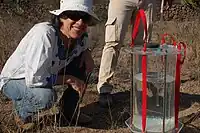Elisabeth Huber-Sannwald | |
|---|---|
 Elisabeth Huber-Sannwald (2017) | |
| Born | Austria |
| Nationality | Austrian |
| Education | Ph.D. |
| Alma mater | |
| Known for | Ecosystem ecology research in Mexico |
| Scientific career | |
| Fields | Biology, botany, rangeland ecology |
| Institutions | Instituto Potosino de Investigación Científica y Tecnológica |
Elisabeth Huber-Sannwald is an Austrian researcher specializing in ecosystem ecology. She is a Full Research Professor in Ecology and Global Environmental Change as well as the Department Head of Instituto Potosino de Investigación Científica y Tecnológica (IPICYT) in San Luis Potosí, Mexico.[1][2][3]
Education
In 1990, she completed her master's degree in Biology and Botany at the University of Innsbruck, in Innsbruck, Austria, where she studied the effects of land-use change on biodiversity.[2] In 1996, she obtained her Ph.D. in Rangeland Ecology at the Utah State University, Logan, Utah, U.S.[2] She did a postdoctoral stay at the Institute of Ecology of the University of Buenos Aires as Scientific Officer of Focus 4: Global Change and Ecological Complexity of the International Program on the Geosphere and Biosphere.[1]
Career and research
From 1998 to 2001, she was a research assistant at the Institute of Grassland and Foliage Sciences of the Technical University of Munich, Freising, Germany.[2] She participated in the design and development of the IPICYT, creating the Division of Environmental Sciences and the program of Postgraduate in Environmental Sciences.[4] In 2001, she joined IPICYT as a Titular C researcher, attached to the National System of Researchers (SNI) Level II, in the area of Global Environmental Change.[4][5]
Huber-Sannwald holds the position of Full Research Professor. Her research is based on the ecology of ecosystems, focusing on the role of plants and soil microorganisms in the biogeochemical and eco-hydrological processes of the arid zones of northern Mexico.[6] She has focused on studying the effects of social and global aspects, such as cattle grazing, land use change and soil degradation in the integrity of socio-ecological systems for a sustainable development of rural lifestyles.[4]
Huber-Sannwald is the Regional President of the Mexican Scientific Society of Ecology.[6] She serves as the associate editor of the journals Rangeland Ecology and Ecological Applications.[6][1] She is the coordinator of the Grupo Regional en Agostaderos Mexicanos para su Investigación y el Liderazgo de su Uso Sustentable (Regional Group in Mexican Ranges for its Research and Leadership of its Sustainable Use) (GRACILIS) and of the Red Mexicana de Investigación Ecológica a Largo Plazo (Mexican Network for Long-Term Ecological Research) (RED MEX-LTER);[7] and the coordinator of the Inter-American Network for Atmospheric and Biospheric Studies (IANABIS).[1] Huber-Sannwald is a member of the Scientific Committee of the Ecological Society of America (ESA); the executive committee of the International Network to Combat Desertification (ARIDnet). She is a member of the Academic Technical Committee, and is responsible for Axis 2/Internationalization of the CONACYT Socio-Ecosystems and Sustainability Network. She is also a member of the executive committee of the Consultative Group on Ecosystem Services of the Sociedad de Toxicología y Química Ambiental.[6]
Recognition
- SNI II. IPICYT. 2007.
- SNI I. IPICYT. 2002.
- Heritage Chair Level II. CONACYT. 2001.
- Don Dwyer, Rangeland Resources Department Scientific Excellence, Utah State University. Utah State University. 1997.
- Fulbright Research. Fulbright. 1991.
- Endowment Scholarship. University of Innsbruck. 1987.[1]
Selected works
- Delgado-Baquerizo, M., Maestre, F., Gallardo, A. et al. (2013) "Decoupling of soil nutrient cycles as a function of aridity in global drylands". Nature 502 (7473), 672–676.
- Huber-Sannwald, E., Martínez-Tagüeña, N., Espejel, I., Lucatello, S., Coppock, D. L., Reyes Gómez, V. M. (2019) "Introduction: International Network for the Sustainability of Drylands—Transdisciplinary and Participatory Research for Dryland Stewardship and Sustainable Development", Stewardship of Future Drylands and Climate Change in the Global South, Springer Nature Switzerland, pp. 1–24. ISBN 978-3-030-22463-9, Switzerland.
- Stuart Chapin III F., E. Sala O., Huber-Sannwald E. (2001) "Global Biodiversity in a Changing Environment: Scenarios for the 21st century", Springer Verlag, p. 376.
- Concostrina-Zubiri, L., Martinez, I., Huber-Sannwald, E., Escudero, A. (2013) "Biological Soil Crusts effects and responses in arid ecosystems: recent advances at the species l". Ecosistemas 22, (3). 95–100.
References
- 1 2 3 4 5 "Datos Curriculares IPICYT- Nombre No Existente". ipicyt.edu.mx (in Spanish). Retrieved 29 April 2023.
- 1 2 3 4 McGuire, Susan R. (1 December 2007). "Speaking With People in Our Profession: An interview with Dr Elisabeth Huber-Sannwald". Rangelands. 29 (6). ISSN 0190-0528. Retrieved 29 April 2023.
- ↑ "Elisabeth F. Huber-Sannwald". United Nations Convention to Combat Desertification. Retrieved 30 April 2023.
- 1 2 3 Guerrero, Ana Luisa (7 April 2017). "Elisabeth Huber-Sannwald, investigadora agradecida con México". México Ciencia y Tecnología (in European Spanish). Retrieved 29 April 2023.
- ↑ Dra Elisabeth Huber Sannwald. youtube.com. Retrieved 29 April 2023.
- 1 2 3 4 Unión Geofísica Mexicana, A.C. (2015). "Semblanza Elisabeth Huber-Sannwald" (PDF) (in French). Conferencia plenaria RAUGM.
- ↑ Hans Günter Brauch; Úrsula Oswald Spring; Czeslaw Mesjasz; John Grin; Patricia Kameri-Mbote; Béchir Chourou; Pál Dunay; Joern Birkmann, eds. (3 February 2011). Coping with Global Environmental Change, Disasters and Security: Threats, Challenges, Vulnerabilities and Risks. Springer Science & Business Media. pp. 1742–. ISBN 978-3-642-17776-7. OCLC 1031328284.